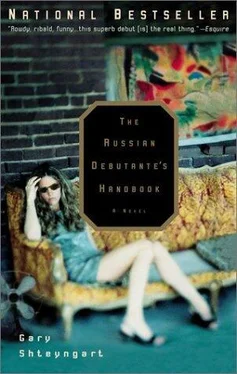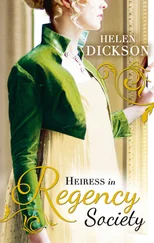Gary Shteyngart - The Russian Debutante's Handbook
Здесь есть возможность читать онлайн «Gary Shteyngart - The Russian Debutante's Handbook» весь текст электронной книги совершенно бесплатно (целиком полную версию без сокращений). В некоторых случаях можно слушать аудио, скачать через торрент в формате fb2 и присутствует краткое содержание. Город: New York, Год выпуска: 2003, ISBN: 2003, Издательство: Riverhead Books, Жанр: Современная проза, Юмористическая проза, на английском языке. Описание произведения, (предисловие) а так же отзывы посетителей доступны на портале библиотеки ЛибКат.
- Название:The Russian Debutante's Handbook
- Автор:
- Издательство:Riverhead Books
- Жанр:
- Год:2003
- Город:New York
- ISBN:0-7865-4177-6
- Рейтинг книги:4 / 5. Голосов: 1
-
Избранное:Добавить в избранное
- Отзывы:
-
Ваша оценка:
- 80
- 1
- 2
- 3
- 4
- 5
The Russian Debutante's Handbook: краткое содержание, описание и аннотация
Предлагаем к чтению аннотацию, описание, краткое содержание или предисловие (зависит от того, что написал сам автор книги «The Russian Debutante's Handbook»). Если вы не нашли необходимую информацию о книге — напишите в комментариях, мы постараемся отыскать её.
and
. The Russian Debutante’s Handbook Bursting with wit, humor, and rare insight,
is both a highly imaginative romp and a serious exploration of what it means to be an immigrant in America.
The Russian Debutante's Handbook — читать онлайн бесплатно полную книгу (весь текст) целиком
Ниже представлен текст книги, разбитый по страницам. Система сохранения места последней прочитанной страницы, позволяет с удобством читать онлайн бесплатно книгу «The Russian Debutante's Handbook», без необходимости каждый раз заново искать на чём Вы остановились. Поставьте закладку, и сможете в любой момент перейти на страницу, на которой закончили чтение.
Интервал:
Закладка:
So it was done this way, and while the vodka did not go down smoothly at first, the gentle American palate soon adapted, or rather, was bypassed, as inebriation set in. Meanwhile, the Stolovan gentleman related his story with great cheer—it was obvious he relished the opportunity to tell it to young, devil-may-care Americans; older Americans, particularly those not schooled in modern irony, might have been less amused.
As a youth, the handsome František studied at the faculty of linguistics and was a star pupil, as could be expected. This was almost half a decade after the Soviet invasion of 1969, when so-called normalization had set in nicely and Brezhnev was still waving at tractors from atop the mausoleum.
František’s father was big at the Interior Ministry, the kind of chipper place where faceless and hairless bureaucrats sent helicopters to hover meters over the open graves of dissidents during their funerals. František’s father was particularly fond of that maneuver. His son, however, had picked up some sense of moral disquietude here or there, most likely at the university, where such things generally lurk. But it was a quiet sense of disquietude, in that while František refused a fast-track career at the Interior Ministry, he nonetheless could not bring himself to sneak around with samizdat pamphlets, attend clandestine meetings in sulfur-smelling basements, or to be reduced to a job as, say, an attendant at a municipal water-closet—the basics of dissident activity.
Instead, he got himself a job as assistant deputy editor of the regime’s favorite newspaper, the appropriately named Red Justice. There were quite a few assistant deputies, but no matter. František with his talent, towering good looks, and a father in the Interior Ministry soon wangled for himself the enviable position of covering “culture,” which meant traveling abroad on the heels of the Stolovan Philharmonic, the opera, the ballet, and any art exhibits that made it out of Mayakovsky Airport.
Abroad! “My life revolved around the export calendars of Prava’s better institutions,” František said, turning to stare wistfully in the direction of what used to be the free world, or so one would imagine. “And sometimes even the provinces coughed up something worth sending to London, although [sigh] more often to Moscow or, God forbid, Bucharest.”
František loved the West like the mistress one gets to see only after her mindful husband gets sent to balance the books in the Milwaukee office. He loved Paris especially, a not-uncommon love affair for Stolovans, whose early-twentieth-century artists had consistently looked to Gaul for inspiration. Once free of the silly commitments at the local embassy and the actual performances, he would roam freely without particular destination in mind, exchanging taxis for the metro, aimless rambles along the Seine for getting totaled in the Montparnasse, all while avoiding the significant Stolovan expatriate community that would likely roast him up along with their carp and dumplings.
But with actual Westerners he was a big success. After the Soviet invasion there was no shortage of sympathy for “a young, oppressed Stolovan, let out for just a glimpse of freedom, only to be corralled back into his Stalinist pen.” And when the lithe French women begged, and indignant British chaps demanded that he defect, he would wipe his tears and tell them about his mama and papa, the hard-pressed, sooted chimney cleaners, who would surely spend their remaining years in the gulag if he missed his two o’clock flight.
“If you read writers like Hrabal or Kundera,” František said, while toasting wordlessly in conjunction with a newly arrived round of Polish Wybornaya, “you will see that sex is not unimportant for the East European man.” And then he went into some of this sex that took place in Hempstead Tudors and TriBeCa lofts; and just looking at this healthy, wide-faced buck one could picture him, without too many acrobatics of the imagination, with almost any woman and in nearly any position, but always sporting the same enthralled and determined expression, his body properly soaked and bruised.
Here Plank and Cohen descended into reverie, staring happily into the depths of their shot glasses as František enumerated his assignations. Vladimir was pleased that they took all this in with a sense of healthy wonderment. Perhaps they weren’t imposing the Alexandra template—the way they had done with the ludicrous German pornography—on Cherice the political activist and Marta the performance artist who had both shared a room in Amsterdam’s Jordaan district only to share František during the world tour of the Prava Children’s Puppet Theater. Who knew what accounted for their budding interest: perhaps Vladimir’s earlier pep talk, or the beer mixed with vodka, or the charm of the former apparatchik gushing over his international delights with, still, a sense of boundless possibility?
But, of course, the cultural beat wasn’t all Dutch tulips and Godiva. There was also the domestic front, and they watched František take an extended swill of beer in preparation for this portion. “Oh, how they would come,” he said. “From every region of every district of every goddamn Slavic country… ‘Citizens, now we are pleased to present the Stavropol Krai Peasant Chorus!’ All the bloody peasant choruses! All those fucking balalaikas! And always singing about some Katyusha picking boysenberries on the river bank and then the local boys spot her and make her blush. I mean, really! Try writing a review of that minus the cynicism. ‘At the Palace of Culture last night, our socialist brethren from Minsk demonstrated once again the progressive peasant culture that has kept local ethnographers enthralled since the heady days of the Revolution.’”
He reached into his shot glass and sprinkled some vodka in his face. “What can I tell you,” he said, squinting. “That was the hell of it, but then it all fell apart anyway…”
“No more Red Justice ?” Vladimir asked.
“Oh, no, it’s still there,” František said. “Some of the older people still read it. The ones on a fixed income who can’t afford sausages and are getting really pissed on that score, the so-called Guardians of the Foot, you might have heard them wailing by the Big Toe. Yes, they pay me to write something now and then. Or I give a speech on the cultural-glory days of Brezhnev and our first working-class president Jan Zhopka for the geezers at the Great Hall of People’s Friendship. You know, that huge place with the old socialist flag hanging out the window like somebody’s dirty laundry.”
“Where is that again?” Vladimir asked. “It sounds familiar.”
“It’s on the embankment facing the castle, right by the most expensive restaurant in Prava.”
“Yes, I’ve been to that restaurant,” Vladimir said, coloring at the thought of his Cole Porter revue with the Groundhog.
“But it’s not fair,” Plank said. “You’re so bright and well-traveled. You should write for one of the new papers.”
“I’m afraid that’s impossible. After our most recent revolution they published a lengthy directory of who did what during the lost years, and it would seem that my family has a whole chapter devoted to it.”
“Maybe you could write for the Prava-dence, ” suggested Cohen.
“Oh, but it’s such crap,” František said. (Thankfully Cohen was too pickled to take umbrage.)
“What I really want to do is open a nightclub,” he said.
“That’s a wonderful idea,” cried Plank. “Sometimes the night life here really rubs me the wrong way.” He stopped. “Excuse me,” he said. “I don’t feel good.”
They let him pass by without much concern. “Yes,” František said. “Your weak-stomached friend is right. Right now there’s only ABBA here. ABBA and some very poor attempts at modernity. When I was…” Again he looked wistfully in some unspecified direction, perhaps this time of the airport. “When I was traveling around, you know, I always got taken to the latest discos with the most attractive men and women, such as yourselves, of course. Now my mouth waters for a good, what is it now?…”
Читать дальшеИнтервал:
Закладка:
Похожие книги на «The Russian Debutante's Handbook»
Представляем Вашему вниманию похожие книги на «The Russian Debutante's Handbook» списком для выбора. Мы отобрали схожую по названию и смыслу литературу в надежде предоставить читателям больше вариантов отыскать новые, интересные, ещё непрочитанные произведения.
Обсуждение, отзывы о книге «The Russian Debutante's Handbook» и просто собственные мнения читателей. Оставьте ваши комментарии, напишите, что Вы думаете о произведении, его смысле или главных героях. Укажите что конкретно понравилось, а что нет, и почему Вы так считаете.












